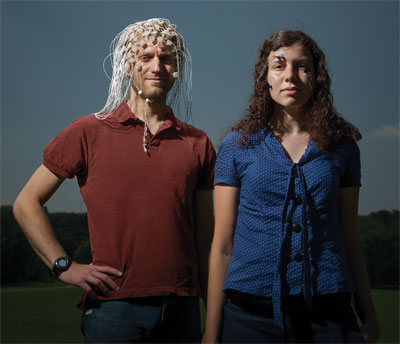
Aaron Heller and Regina Lapate. The geodesic sensor net and electrodes that they wear are among the tools they use.
Aaron Heller, the first recipient of the James L. Davis Memorial Graduate Support Fund, studies the neurobiology of depression to develop new therapies. Regina Lapate, the second recipient, explores how emotional awareness might help overcome negative experiences.
This kind of neuro-imaging work is why Michelle Davis established the fund to honor the husband she lost to a motorcycle accident 13 months after they were married. “James was incredibly intelligent and empathetic, and he always saw the shades of gray in life,” she said. “One day he dreamed of using his programming skills with supercomputers to help the study of major medical illnesses.”
From Tragedy, Hope
James Davis was a scientist at heart. He wanted to know how science affected the body and the brain. He began taking computers apart when he was young and after earning a math degree became a software engineer, who hoped to one day study medicine. “He was a really happy guy,” Davis said. “He loved what he was doing, and he loved sharing it.”
In James, Davis found a soul mate. “Our 13-month marriage was heaven on earth,” she said. “We loved photography, hiking, playing piano, cooking, car mechanics, “Star Trek,” the North Shore of Lake Superior and taking things apart to put them back together.”
James Davis died August 14, 2008, when a woman reaching for her cell phone charger rear-ended his motorcycle on a St. Paul, Minnesota, highway. Davis knew she wanted to invest her husband’s memorial gifts in research to understand and treat depression, a disease that plagued her husband and made him feel trapped, especially in his youth. Her brother went online and found neuroscience pioneer Richard Davidson and his Waisman Center laboratory, where Davis established a graduate support fund in her husband’s name.
“I hope one day we can understand the etymology of depression and help end the suffering within us all. I thank the scholarship recipients for their dedication to research that honors my husband and all those who feel trapped by the disease,” Davis said.
Exploring Awareness
The award allowed Lapate to pursue new research about the degree to which awareness enhances the encoding and retrieval of memories. The results could impact the treatment of a number of affective disorders and sharpen clinical approaches to anxiety and depression.
The big picture is looking at the necessary components for emotional regulation, Lapate said. “If you are fully aware of how an adverse memory was formed, will you be better able to change the memory or regulate the emotion later? If you fully recognize a cue that triggers adverse memories, can you better regulate the emotion?”
Someone with a spider phobia, for example, may avoid gardens because leafy patterns trigger the fear. Awareness of the cue may allow that person to think through the possibilities of finding a spider and make the choice to continue her walk.
A native of Brazil, Lapate was an undergraduate exchange student when she first volunteered in Davidson’s lab. She started her graduate program in 2008.
Understanding Depression
Heller investigates the neuro-biology underlying depression.
Sometimes people with depression experience sadness, he said. Lesser known is an inability to experience pleasure, and Heller’s work is concerned with understanding the biological causes that underlie the ability to experience pleasure.
“I hope one day we can understand the etymology of depression and help end the suffering within us all. I thank the scholarship recipients for their dedication to research that honors my husband and all those who feel trapped by the disease.”
Michelle Davis, Donor
He performs and analyzes functional Magnetic Resonance Imaging scans (fMRI), measuring changes in facial activity connected with emotion. Still relatively new, fMRI allows scientists to observe parts of the brain and which parts are involved in specific functions.
Heller and his colleagues have submitted a paper to the Proceedings of the National Academy of Sciences, which investigates how individuals with depression display an inability to sustain activity in the brain associated with reward and positive emotion. A second journal article will investigate how abnormal connectivity between two specific brain areas can help predict a patient’s response to drug therapy.
Heller, from San Francisco, studied the basic neuroscience of how memories are formed and retrieved before moving to the University of Wisconsin-Madison. He looked for a graduate program that would perform research that would quickly translate to patient care. “I wanted to be able to do something I really felt could have an impact,” he said.
Changing Lives
Michelle Davis’ life changed in unexpected ways after James died. A business analyst, she discovered she could not go back to her job. “Once you’ve lost the life you wanted, you want to go crawl in a hole and not see anybody because you’re afraid they’re going to die,” she said.
Therapy, the people in her life and a volunteer stint at a friend’s school reawakened her sense of wanting to give and to be around people. Visiting Davidson and the students in his lab helped her understand how people stay trapped in grief.
Davis is finishing a master’s of instruction program in Minnesota with plans to become a high school English teacher and mentor.
